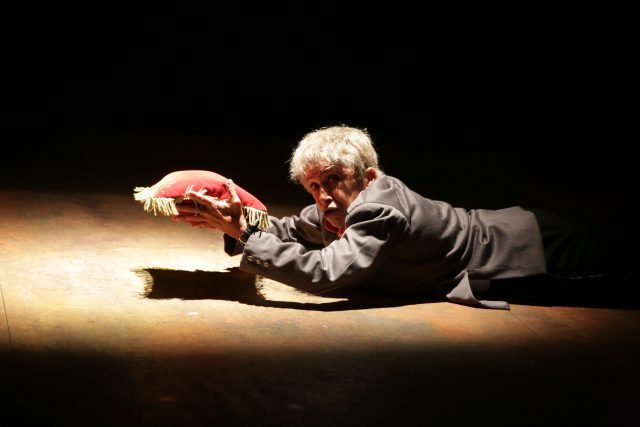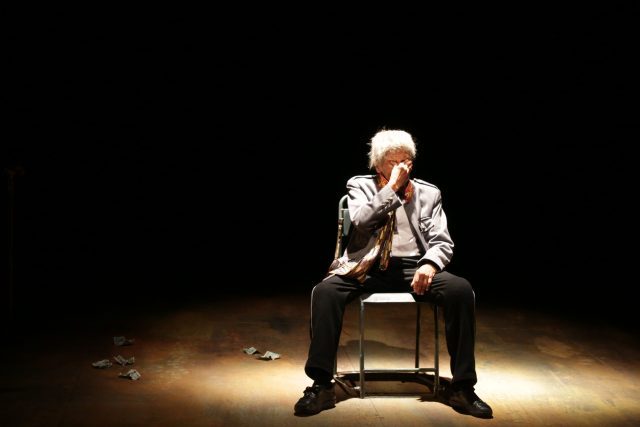
Kathryn Hunter gives a tour-de-force performances as multiple characters in The Emperor (photo by Gerry Goodstein)
Theatre for a New Audience, Polonsky Shakespeare Center
262 Ashland Pl. between Lafayette Ave. & Fulton St.
Tuesday – Sunday through September 30, $90-$115
866-811-4111
www.tfana.org
The inestimable Kathryn Hunter is extraordinary as eleven characters subservient to Haile Selassie in the U.S. premiere of The Emperor, which opened tonight at Theatre for a New Audience, where it continues through September 30. The seventy-minute play was adapted by Colin Teevan from Polish journalist Ryszard Kapuściński’s 1978 book, which detailed the fall of the Ethiopian emperor as witnessed by those around him. The hoarse-throated Hunter portrays such figures as L.M., the emperor’s valet de chamber; F., the wiper of the emperor’s lapdog’s urine; Y.M., the keeper of the emperor’s private zoo; G.S.-D., the emperor’s pillow bearer; and Z.S.-K., the emperor’s minister of information. For each character, Hunter takes a different position onstage, uses a different voice and movement style, and makes small costume and prop changes, adding a hat, a cane, or epaulettes. Onstage with her is Ethiopian musician Temesgen Zeleke, who plays the krar, a multi-stringed bowl-shaped lyre, as well as taking a few parts himself: a rebel general and two students, one the son of G.S.-D. “Only memories / That is all that remains,” L.M. says. The subjects, who were all interviewed by Kapuściński, discuss how Selassie, who ruled Ethiopia from 1930 to 1974, slept, met with spies, fed the animals in his zoo, dealt with men he considered traitors, and prayed: “Lord save me from those who crawling on their knees, / Hide the knife that they would stick into my back.” T.K.B., the emperor’s chauffeur, recalls how he would drive Selassie in a Rolls, Lincoln, or Mercedes to the palace gate, where poor people would be seeking help, along with “dignitaries and officials, / Each burning with one desire; / To be noticed.”

Ethiopian musician Temesgen Zeleke takes on a few roles in TFANA production (photo by Gerry Goodstein)
Together the brief monologues form a telling look at what life under the “King of Kings” and “Elect of God” was like for the general populace, his cabinet, and his numerous subordinates, who handled even his most bizarre and absurd proclivities with respect in order to protect their job — and their life. Ministry of the Pen recording clerk T.L. explains, “Everyone waited to see / What the Emperor would do next, / Everyone was ashamed of letting / This conspiracy occur. Everyone was fearful of His Majesty’s wrath.” Kapuściński found similarities between Selassie and the corruption occurring in his native Poland; forty years later, comparisons can be made to so many other autocrats and despots — including President Trump, who has shown a fondness for several dictators. After describing how Selassie was able to turn perception around following a peasant revolt, Z.S.-K. declares, “That is the art of governing!” But Selassie started losing control after Jonathan Dimbleby’s documentary, Ethiopia: The Unknown Famine, was seen around the world, revealing how the emperor was really taking care of his people, even as Z.S.-K. defended his boss.

A key character can’t bear to see what happens next in The Emperor (photo by Gerry Goodstein)
A joint presentation of Young Vic, HOME, and Les Théâtres de la Ville de Luxembourg, The Emperor is directed by Walter Meierjohann, who previously collaborated with Hunter and Teevan on Young Vic’s Kafka’s Monkey. The play works well when Hunter is moving about Ti Green’s spare stage (Green also designed the costumes), expertly lit by Mike Gunning, and Zeleke sits in the corner, playing and singing. But when he gets up and interacts with Hunter, the pacing grows awkward; perhaps part of the problem is that we are so focused on Hunter (Fragments, The Valley of Astonishment) that we don’t want her dazzling performance to be interrupted for any reason, whether she’s just talking, doing calisthenics, or diving across the floor with a royal pillow. It’s even a treat to watch the way she runs offstage at the end of the show. But the message about power, corruption, and dictatorships still comes across loud and clear, especially at a time in America when an administration appears to be at war with itself and many citizens believe the emperor has no clothes.